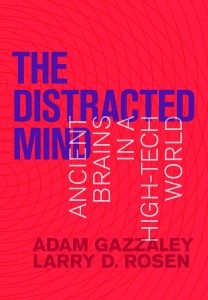 Most of us will freely admit that we are obsessed with our devices. We pride ourselves on our ability to multitask. We feel we can read work email, reply to texts, check Facebook, watch video clips, talk on the phone, send texts, and drive a car … all at the same time. We appear to enjoy family dinners with glowing smartphones next to our plates. We “think” we can do it all, 24/7/365! Never mind the errors in the email, the near-miss on the road, and the unheard conversation at the table. And this constant connection drives our brain chemistry to be in a constant state of high alert which disrupts our work, our interactions and our all-important night’s sleep. In The Distracted Mind, Drs. Adam Gazzaley and Larry Rosen — a neuroscientist and a psychologist — explain why our brains aren’t built for multitasking, and suggest better ways to live in a high-tech world without giving up our modern technology.
Most of us will freely admit that we are obsessed with our devices. We pride ourselves on our ability to multitask. We feel we can read work email, reply to texts, check Facebook, watch video clips, talk on the phone, send texts, and drive a car … all at the same time. We appear to enjoy family dinners with glowing smartphones next to our plates. We “think” we can do it all, 24/7/365! Never mind the errors in the email, the near-miss on the road, and the unheard conversation at the table. And this constant connection drives our brain chemistry to be in a constant state of high alert which disrupts our work, our interactions and our all-important night’s sleep. In The Distracted Mind, Drs. Adam Gazzaley and Larry Rosen — a neuroscientist and a psychologist — explain why our brains aren’t built for multitasking, and suggest better ways to live in a high-tech world without giving up our modern technology.
The authors explain that our brains are limited in their ability to pay attention. We don’t really multitask but rather switch rapidly between tasks. Distractions and interruptions, often technology-related — referred to by the authors as “interference” — collide with our goal-setting abilities. We want to finish this paper/spreadsheet/sentence, but our phone signals an incoming message and we drop everything. Even without an alert, we decide that we “must” check in on social media immediately lest we upset someone by not commenting, liking or responding as quickly as we always do. And this is not just a teenage or young adult problem. It affects us all.
Gazzaley and Rosen offer practical strategies, backed by science, to fight distraction. They don’t suggest that we give up our devices, but that we use them in a more balanced way. We can change our brains with meditation, video games, and physical exercise; we can change our behavior by planning our accessibility and recognizing our anxiety about being out of touch even briefly. The Distracted Mind is an up-to-date treatise on distraction and Drs. Gazzaley and Rosen present you, the reader, with the latest research, in down-to-earth terms that are easily examined and understood, to help you become more focussed on what is important in our lives — family, friends, work and leisure time — without being constantly distracted by our high-tech world.
Reviews:
Many of us are enamored with modern technology, finding it hard to put down our cell phones or resist obsessively checking Facebook posts. But this behavior can make us inefficient, socially isolated, and unhappy. In Distracted Mind, psychologists Adam Gazzaley and Larry Rosen explain how our minds are easily hijacked by technology and why we’re not capable of efficient multitasking, despite our belief to the contrary. They suggest strategies for dealing with multiple distractions, including mindfulness meditation, exercise to reduce stress, and blocking accessibility to our devices when trying to concentrate or participate in social encounters.
